Thailand - January 13, 2018 - 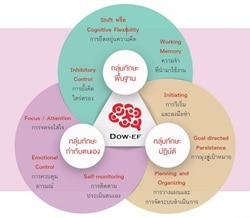 “Children are the future of the nation” or “Today’s children are tomorrow’s adults” are commonly-used phrases that reflect how one nation’s future depends on the quality of their youth. Children are like white canvas waiting to be painted by adults. As Thailand is entering the era of Thailand 4.0 and the emerging Aging Society in the next 15 years, there’s a call for urgency in improving the country’s competency through technology, innovation, and creativity; most importantly, the preparation for our youth to be ready for the fast-paced and competitive world.
“Children are the future of the nation” or “Today’s children are tomorrow’s adults” are commonly-used phrases that reflect how one nation’s future depends on the quality of their youth. Children are like white canvas waiting to be painted by adults. As Thailand is entering the era of Thailand 4.0 and the emerging Aging Society in the next 15 years, there’s a call for urgency in improving the country’s competency through technology, innovation, and creativity; most importantly, the preparation for our youth to be ready for the fast-paced and competitive world.
EF and the quality of Thai youth in the era of Thailand 4.0
 From an international research on neuroscience, psychology, and education, it is found that the development of children’s potential to become successful is based on the understanding of the brain’s nature and how it works. This topic was discussed during EF Symposium 2017 “Thai Children’s Brain: The Foundation of Thailand’s Future” session where “DOW - EF Development for Successful Youth & Rayong Happiness” project was showcased. The project was initiated in 2016 by Dow Thailand Group and 19 agencies from Rayong Province including community leaders, teachers, village health volunteers, health promoting hospital officers, public health officers, and nurseries. The objective is to enhance youth care with Executive Functions (EF) at early childhood.
From an international research on neuroscience, psychology, and education, it is found that the development of children’s potential to become successful is based on the understanding of the brain’s nature and how it works. This topic was discussed during EF Symposium 2017 “Thai Children’s Brain: The Foundation of Thailand’s Future” session where “DOW - EF Development for Successful Youth & Rayong Happiness” project was showcased. The project was initiated in 2016 by Dow Thailand Group and 19 agencies from Rayong Province including community leaders, teachers, village health volunteers, health promoting hospital officers, public health officers, and nurseries. The objective is to enhance youth care with Executive Functions (EF) at early childhood.
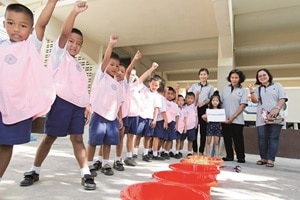 In addition to the government’s infrastructure support to prepare the country for Thailand 4.0, the preparation in social aspect and immunity for Thai youth in the fast-growing society is equally important. Several parties have turned their attention to the development of children’s cognitive thinking through Executive Functions or EF. EF is located in the prefrontal cortex of the brain. It governs thinking process and behavior of children aged 0-6 years to adolescents. These skills are crucial for not only intelligence enhancement but also morale-boosting. EF helps encourage children to express their confidence, initiate ideas, act upon them, ask questions and search for the answers in an appropriate manner. It forms a foundation for positive disciplines.
In addition to the government’s infrastructure support to prepare the country for Thailand 4.0, the preparation in social aspect and immunity for Thai youth in the fast-growing society is equally important. Several parties have turned their attention to the development of children’s cognitive thinking through Executive Functions or EF. EF is located in the prefrontal cortex of the brain. It governs thinking process and behavior of children aged 0-6 years to adolescents. These skills are crucial for not only intelligence enhancement but also morale-boosting. EF helps encourage children to express their confidence, initiate ideas, act upon them, ask questions and search for the answers in an appropriate manner. It forms a foundation for positive disciplines.
Building the EF Society
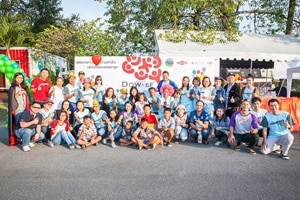 Every member of the society plays a part in forming a constructive environment for children’s upbringing. “DOW - EF Development for Successful Youth & Rayong Happiness” project aims to integrate EF knowledge in every aspect of the society to help prepare the country for Thailand 4.0. Poranee Kongamornpinyo, Public Affairs Director, said, “Dow Thailand Group foresees the importance of EF for children’s development through integrated and sustainable collaboration among Ban Chang Strategic Development Team, RLG Group (Rakluke), community leaders, teachers, and volunteers including “Change Agents”. The team has been working to expand and track the progress continuously and drive the project to success through individual expertise, contribution, knowledge and technique sharing within the collaborative network.” A human brain is categorized by function into 3 main parts. EF is a mental process in the frontal part of the brain that controls cognitive, analyzing, inhibiting, and emotional skills. This part of the brain is best developed at the age of 0-6 years old. It is a set of skills that governs IQ and EQ and is classified into three groups which are Basic Skills, Self-Regulation Skills, and Practice Skills. These skills enable children to learn, solve problems, socialize, and lead a happy and successful life.
Every member of the society plays a part in forming a constructive environment for children’s upbringing. “DOW - EF Development for Successful Youth & Rayong Happiness” project aims to integrate EF knowledge in every aspect of the society to help prepare the country for Thailand 4.0. Poranee Kongamornpinyo, Public Affairs Director, said, “Dow Thailand Group foresees the importance of EF for children’s development through integrated and sustainable collaboration among Ban Chang Strategic Development Team, RLG Group (Rakluke), community leaders, teachers, and volunteers including “Change Agents”. The team has been working to expand and track the progress continuously and drive the project to success through individual expertise, contribution, knowledge and technique sharing within the collaborative network.” A human brain is categorized by function into 3 main parts. EF is a mental process in the frontal part of the brain that controls cognitive, analyzing, inhibiting, and emotional skills. This part of the brain is best developed at the age of 0-6 years old. It is a set of skills that governs IQ and EQ and is classified into three groups which are Basic Skills, Self-Regulation Skills, and Practice Skills. These skills enable children to learn, solve problems, socialize, and lead a happy and successful life.
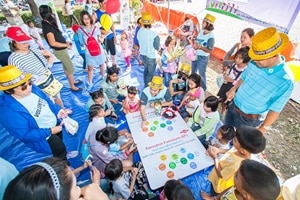 The research of National Statistical Office of Thailand has shown that the number of cross-generation families in which father, mother, children, and senior relatives are living together has increased by 35.9%1. This suggests that all family members play a role and contribute to the process of children’s upbringing. Assistant Professor Dr. Vorasit Siripornpanich, said, “EF development in children is directly related to neuroscience and high-level brain processing especially in the frontal part of the brain. EF is classified into three groups which are Basic Skills, Self-Regulation Skills, and Practice Skills and is subcategorized into nine skills. EF needs to be well developed as it constructively contributes to one’s life. The prime period for EF development is between the ages of 3-6 years old until pre-adult. This indicates that the earlier we develop these skills in children, the better we can enhance their learning process enabling them to have life immunity.”
The research of National Statistical Office of Thailand has shown that the number of cross-generation families in which father, mother, children, and senior relatives are living together has increased by 35.9%1. This suggests that all family members play a role and contribute to the process of children’s upbringing. Assistant Professor Dr. Vorasit Siripornpanich, said, “EF development in children is directly related to neuroscience and high-level brain processing especially in the frontal part of the brain. EF is classified into three groups which are Basic Skills, Self-Regulation Skills, and Practice Skills and is subcategorized into nine skills. EF needs to be well developed as it constructively contributes to one’s life. The prime period for EF development is between the ages of 3-6 years old until pre-adult. This indicates that the earlier we develop these skills in children, the better we can enhance their learning process enabling them to have life immunity.”
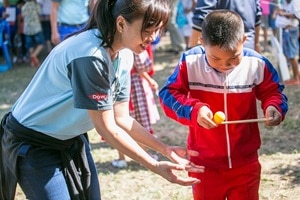 On Thai Children’s Day, Dow volunteers joined hands with Change Agents to organize EF activities for parents and children in Ban Chang district. Some of the activities were “EF music activity” where each child was responsible for one musical instrument while the instructors assigned a sign for the instrument for the children to play when prompted which helped with the children’s ability to focus on a specific task, “EF puzzle activity”, and “EF art and craft activity” for instance. All of these activities could enhance emotional, social, and psychological development in children. They were given the opportunity to practice self-assessment, problemsolving, decision making skills, and creativity while being inspired. Most importantly, the children were able to share quality time with their parents and friends to help improve their social skills.
On Thai Children’s Day, Dow volunteers joined hands with Change Agents to organize EF activities for parents and children in Ban Chang district. Some of the activities were “EF music activity” where each child was responsible for one musical instrument while the instructors assigned a sign for the instrument for the children to play when prompted which helped with the children’s ability to focus on a specific task, “EF puzzle activity”, and “EF art and craft activity” for instance. All of these activities could enhance emotional, social, and psychological development in children. They were given the opportunity to practice self-assessment, problemsolving, decision making skills, and creativity while being inspired. Most importantly, the children were able to share quality time with their parents and friends to help improve their social skills.
Currently, “DOW - EF Development for Successful Youth & Rayong Happiness” project has expanded to 65 schools and 11 public health institutions in Rayong. 240 Change Agents have helped drive the project through 60 activities. A total of 60,000 people have benefited from this project. This indicates that a strong partnership is the key to success to help lead Thai children on the path to happiness and to create a better world of all of us.
1 http://service.nso.go.th/nso/web/article/article_62.html
About EF (Executive Functions)
A human brain is categorized by function into 3 main parts. EF is a mental process in the frontal part of the brain that controls cognitive, analyzing, inhibiting, and emotional skills. This part of the brain is best developed at the age of 0-6 years old. It is a set of skills that governs IQ and EQ and is classified into three groups which are Basic Skills, Self-directing Skills, and Practice Skills. These skills enable children to learn, solve problems, socialize, and lead a happy and successful life.
About Dow Thailand Group
Consisting of Companies of Dow Chemical Thailand and the SCG-Dow Group, Dow Thailand, the leading science group of companies in Thailand, is the largest manufacturing base of Dow Chemical in the Asia-Pacific region and a leading importer of chemical products for diverse industries in Thailand, including those for agriculture and household pesticides. The group is committed to developing science-driven innovations and strives to form effective collaboration and networks to bring about sustainability for its business as well as society. More information about Dow Thailand can be found at www.dow.com/thailand
